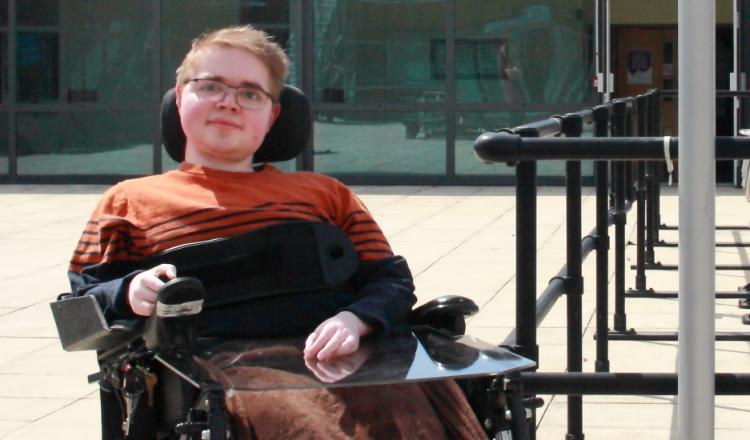Conor McParland
'Staff within the Physics department are always willing to share their knowledge and expertise and it’s great to know there is always someone I can go to with a question.'

Can you introduce yourself and tell us a bit about your background?
I’m Conor McParland and I am doing a PhD here at Liverpool with the ATLAS experiment, as part of the LIV.DAT CDT. I’m from Liverpool and was an undergraduate student here and I really enjoyed it. I was especially interested in particle physics and so chose to apply for a PhD in this area. I’m currently in my fourth year and, with a year’s extension, thanks to the IOP Bell Burnell scholarship, I have one more year to complete. I am now in the process of writing my thesis.
Can you tell me about your PhD?
My PhD project involves looking for the currently unobserved decay of the tau lepton into 3 muons. This decay would violate conservation of lepton flavour. Whilst violation of flavour has been observed in neutral leptons and quarks, it has never been observed in charged leptons. Evidence of this decay would be unambiguous evidence of new physics. The data I’m using has been collected by the ATLAS experiment at CERN.
What are you enjoying most about your current research?
I enjoy the whole thing! There are lots of different aspects to the ATLAS experiment and its great working with so many different people and hearing their perspectives. The research has given me opportunities to develop my data analysis skills and to learn new skills. I have presented my work and findings to a range of audiences and feel that this is area where I’ve gained confidence.
There is a great variety to what I do, with something new every week. I’ve really enjoyed attending meetings of the different subgroups within ATLAS and this has really expanded my knowledge.
What attracted you to physics?
I have always been very curious about how things work and understanding the universe. I naturally gravitated towards maths and science at school, with a particular interest in physics. I still find it incredible how such a seemingly small amount of maths in the Standard Model can describe so much of what we see around us so well.
Why did you to choose to undertake your research at Liverpool?
Liverpool is linked with lots of particle physics experiments, not just ATLAS, but also, for example, neutrino and dark matter physics experiments. This means that the particle group here is quite large and so this provides a wide breadth of viewpoints and expertise.
The department and staff here are friendly and supportive so knew that I would be working in a positive environment.
What challenges have you faced if any and how were they overcome?
To begin with, I was on a steep learning curve. There are always general challenges, like code going horribly wrong. I sometimes have a tendency to overcomplicate things, so I have to take a step back and look at a problem from a new perspective. This means I can make sure I am taking the most efficient route to a solution and not adding unnecessary steps.
What is the support at the University of Liverpool like?
Staff within the Physics department are always willing to share their knowledge and expertise and it’s great to know there is always someone I can go to with a question. On a more personal level, my supervisors, Carl and Jan have been extremely encouraging and supportive.
What do you hope to go on to do after graduation?
I would really like to go on to do a post doc. I am really enjoying my research and would love to do continue in this.
Ideally, given the support I have been given, I would like to stay at the University of Liverpool.
What parts of your experience do you feel have been unique to you?
Although my situation, being a wheelchair user, is comparatively unusual, it hasn’t presented itself as a challenge, thanks to the support I’ve had from the department